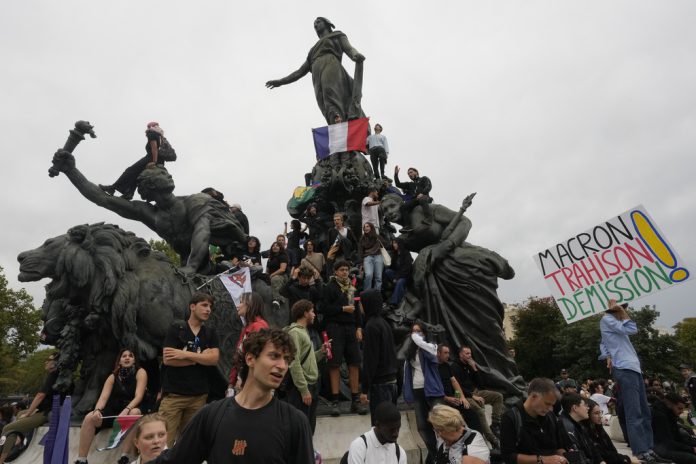PARIS (AP) — Thousands of protesters took to the streets across France on Saturday, responding to a call from a far-left party leader who criticized as a “power grab” the president’s appointment of a conservative new prime minister, Michel Barnier.
The protests directly challenged President Emmanuel Macron’s decision to bypass a prime minister from the far-left bloc following a deeply dividing —and divided — legislative election result in July. Authorities did not record a huge turnout nationwide.
The left, particularly the France Unbowed party, views Barnier’s conservative background as rejecting the electorate’s will, further intensifying the EU’s second economy’s already charged political atmosphere. Saturday’s demonstrators denounced Barnier’s appointment as denying democracy, echoing France Unbowed leader Jean-Luc Melenchon’s fiery rhetoric from recent days.
In Paris, protesters gathered at Place de la Bastille and tensions ran high as police prepared for potential clashes. Some carried placards reading “Where is my vote?”
At the head of the Parisian procession, Melenchon spoke passionately, declaring that “the French people are in rebellion. They have entered into revolution.”
“There will be no pause, no truce. I call you to a long-term battle,” he added.
In the southwestern city of Montauban, a rally speaker told the crowd that “the people have been ignored.” Other protests took place is some 150 locations nationwide.
While Barnier was meeting with healthcare workers at Paris’ Necker Hospital for his first official visit as prime minister, opponents say the unrest in the streets is shaping his government’s future.
Barnier, who is working to assemble his Cabinet, expressed a commitment to listening to public concerns, particularly about France’s public services.
Jordan Bardella, leader of the far-right National Rally (RN), warned that Barnier was “under surveillance” by his party as well. Bardella, speaking at the Chalons-en-Champagne fair, called for the prime minister to include his party’s priorities in his agenda, particularly regarding national security and immigration.
Barnier, 73, is the oldest of the 26 prime ministers that have served modern France’s Fifth Republic. He replaces the youngest, Gabriel Attal, who was 34 when he was appointed just eight months ago.
Attal was forced to resign after Macron’s centrist government performed poorly in the July snap legislative elections. Macron called the election in the hopes of securing a clear mandate, but it instead produced a hung parliament, leaving the president without a legislative majority and plunging his administration into turmoil.
Attal was also France’s first openly gay prime minister. French media and some of Macron’s opponents, who immediately criticized Barnier’s appointment, quickly dug up that, when serving in parliament in 1981, the new prime minister had been among 155 lawmakers who voted against a law that decriminalized homosexuality.
Though Barnier brings five decades of political experience, his appointment offers no guarantee of resolving the crisis. His challenge is immense: He must form a government that can navigate a fractured National Assembly, where the political spectrum is deeply divided between the far left, far right, and Macron’s weakened centrist bloc. The outcome of the snap poll, far from providing clarity, has only served to destabilize both the country and Macron’s grip on power.
The president’s decision to turn to Barnier, a seasoned political operator with deep ties to the European Union, is seen as an attempt to bring stability to French politics. And Barnier, who gained prominence as the EU’s chief Brexit negotiator, has faced daunting tasks before.
Critics say Macron, elected on the promise of a break from the old political order, now finds himself battling the instability he once promised to overcome.
Source: post





